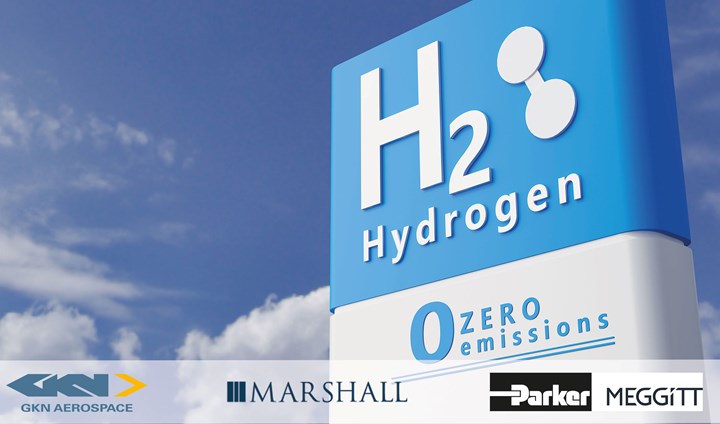GKN explores LH2 fuel systems with Marshall, Parker Aerospace
MOU partnership will encompass all areas of hydrogen fuel cell system development to achieve a complete hydrogen propulsion system for zero-emission mid-range aircraft.
GKN Aerospace (Redditch, U.K.), Marshall (Cambridge, U.K.) and Parker Aerospace (Cleveland, Ohio, U.S.) are collaborating under a Memorandum of Understanding (MOU) aimed at exploring liquid hydrogen (LH2) fuel system solutions for the next generation of zero-emission aircraft.
The MOU encompasses all areas of hydrogen fuel system development. Both composite and metallic technology development is of interest to the companies. Furthermore, GKN Aerospace recently announced an EPSRC Prosperity Partnership with the University of Bath, named Zenith, which includes a substantial focus on composite materials and structures for hydrogen storage.
The LH2 fuel system to be jointly developed will be capable of supporting hydrogen electric and combustion applications. In developing the system, Marshall, GKN Aerospace and Parker will combine their extensive experience in the design, testing, certification and manufacture of novel fuel systems for aerospace applications.
“By working alongside Marshall and Parker, who have deep expertise in fuel systems, we can accelerate the development of the technology building blocks required for a complete hydrogen propulsion system for mid-range aircraft,” Russ Dunn, CTO of GKN Aerospace, says. “This partnership, combined with our other collaborations, is a significant step towards a sustainable future for aviation.”
The proposed LH2 fuel system collaboration will benefit significantly from the ongoing U.K. Aerospace Technology Institute (ATI)-funded, GKN Aerospace-led, H2GEAR program, which will ground test a scalable hydrogen electric fuel cell propulsion system in 2025. The intent is to bring the complete scalable fuel system and propulsion system together in a single flight test bed environment before the end of the decade. At the Paris Air Show in June 2023, GKN Aerospace signed a collaboration MOU to explore an integrated flight demonstration of the end-to-end system.
Initial studies suggest that such a system could support a wide range of aircraft, including commuter planes (under 19 passengers), business jets and regional aircraft (up to 100 passengers). Scalability of the system for larger narrow-body aircraft is currently being studied.
Related Content
-
Composites end markets: Automotive (2024)
Recent trends in automotive composites include new materials and developments for battery electric vehicles, hydrogen fuel cell technologies, and recycled and bio-based materials.
-
JEC World 2023 highlights: Recyclable resins, renewable energy solutions, award-winning automotive
CW technical editor Hannah Mason recaps some of the technology on display at JEC World, including natural, bio-based or recyclable materials solutions, innovative automotive and renewable energy components and more.
-
Update: THOR project for industrialized, recyclable thermoplastic composite tanks for hydrogen storage
A look into the tape/liner materials, LATW/recycling processes, design software and new equipment toward commercialization of Type 4.5 tanks.
















